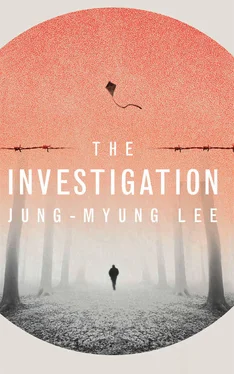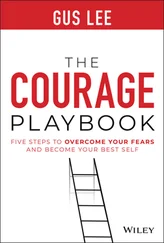Months later, early on the morning I was to enlist in the army, I rubbed my newly shaved head and thought about my father, who had walked along this path before me. Just like that day when my father went off many years ago, a black train puffed out steam and a military band played a martial song. I wasn’t afraid. Nor did I feel it was unfair that I was to become a soldier. I just worried about my mother, who was too small to open the heavy gate over our shop front by herself every morning.
After training I was assigned to be a guard at Fukuoka Prison. High walls, sharp barbed wire and cold bars enclosed my future. My youth was incarcerated in a brown uniform. I was strictly isolated from books. No text was allowed. Staid directives were the only things to read, and the only words I wrote were in the log detailing my rounds. Hungry for words, I read everything I could lay my hands on. I devoured incarceration logs, punishment records, directives and administrative documents, even the entrance and exit signs. But they were merely dead words that couldn’t move me. My soul was perpetually malnourished. I wanted to encounter a living, vibrant line of prose. But that was a luxury not afforded a soldier in wartime.
That was how I walked into war — as though entering dreamland. I wanted to return to my former life. I wanted desperately for the war to end so that I could toss my military uniform aside, replace it with a school uniform and read Stendhal. But I didn’t know when that would happen, or whether the war would ever end. I didn’t know that, instead of the school uniform, I’d be wearing prisoner’s garb when the war was finally over.
The inside of the workroom was damp with sweat. Together the prisoners repaired and dyed military uniforms and clothes. This indoor workroom was reserved for skilled long-term prisoners. The less fortunate suffered outdoors in the cold, willing their frozen bodies to make bricks, haul materials on their backs, push wheelbarrows and shovel the cold earth. Any talk during working hours was forbidden; if caught, the prisoners would be beaten within an inch of their lives. Even a brief pause caused work to pile up and invited beatings from the guards. They died from torture, the cold and disease. Families were given ten days to claim the corpses. If nobody showed up, their bodies were donated for research. The squat hill outside sprouted a cemetery for those unclaimed bodies; as the war grew intense and the number of prisoners increased, the cemetery grew in tandem.
The prisoners tasted their only freedom during outdoor break time from four to five in the afternoon. Exhausted Koreans grouped together near the wall, seeking the wan rays of the sun. They murmured endlessly among themselves, secretively, turning the yard into a noisy marketplace. This ruckus always made the guards tense; those manning the checkpoints made sure to keep their machine guns loaded. These prisoners insisted on their innocence, telling stories to each other. Although they were thieves and thugs and crooks and spies, they had a visceral understanding of each other’s sense of injustice; they all believed that they’d been caught in cunning Japanese traps and falsely accused. They raged in despair.
I walked along the wall, watching the group clustered together. They were all troublemakers; quick fists were a source of power within the prison. I was well aware that prisoners frequently attacked guards. When unpopular guards were on duty, they purposefully picked fights and disabled machines in their work unit, despite the certainty of beatings and solitary confinement. They quietened down when I approached, gripping the hilt of my club. ‘I’m Watanabe Yuichi! I am the investigator assigned to uncover Sugiyama’s murder. You better cooperate.’
The men looked me up and down. Prisoner 156, a balding former dockworker, mocked me. ‘I thought the special investigator was from the Special Higher Police. But a brand-new student-soldier? Well, sir, we haven’t done a thing.’
I’d heard about him. Prisoner 156 had stowed away ten years ago to Shimonoseki, and three years ago he’d received a seven-year sentence for leading a dockworker riot in Tokyo. The Japanese workers were the ones who’d plotted and instigated it, but 156 had been made a scapegoat. I studied each man carefully. One of them spat on the ground and another feigned disinterest, picking dirt from under his nails. I could tell they were hiding something. Then again, everyone in this prison was hiding something.
‘I didn’t say you did,’ I snapped. ‘But you might in the future. Your talents lie in fighting, ostracizing, violating the rules and getting sent to solitary, no?’
‘A student-soldier? Then you can’t even be twenty,’ Prisoner 945 mocked. ‘A snot-nosed kid investigating a murder?’
Prisoner 397 turned to him. ‘The warden knows that if this incident gets out, he’s done for. That’s why he’s not calling the Special Higher Police. He’s trying to hush it up.’
They were all playing with me. My cheeks burned. I wanted to pull my club out and hit them.
‘It’s too bad that the guard died, but it has nothing to do with us. Just leave us alone,’ said Prisoner 945 soothingly.
‘I’m not going to bother you. But I’m going to uncover who did it.’ I met each person’s eyes as though I were stamping a seal.
Prisoner 156 frowned. ‘Don’t even think about blaming us. You don’t have any proof. I don’t know anything about how that arsehole died, but I know one thing. He got what was coming to him. So watch out, if you don’t want that to happen to you.’
I swallowed. ‘Is that a threat?’
‘I guess so, if it scares you.’
‘Don’t you talk back to me. I can send you to solitary.’ My flinty words didn’t have any effect.
‘Go ahead, put me in solitary. I can spend a week there — easy. Wanna beat me up? Be my guest. Any wound will heal in a week.’ 156 pounded his chest with his fist and shoved his head towards me, taunting me to club him.
I glared at him, my hand trembling on the club. I knew I would lose, the moment I pulled it out. I wasn’t Sugiyama. The club wasn’t the solution.
Prisoner 543 glanced at the watchtower. ‘It’s stupid to kill a guard,’ he commented slyly. ‘Who could have done such a ridiculous thing?’
Not caring that I was right there, Prisoner 156 snapped impatiently, ‘Why is it stupid to kill an evil guard? Comrade, you know he deserved it!’
They all turned to look at a man standing far away, whose wide chest bore clear numbers: 331. He continued walking around the yard, oblivious to the men. Then he turned and came closer.
‘Comrade Choi!’ 156 called loudly. ‘You tell us. Who do you think killed that son-of-a-bitch?’
‘It doesn’t matter who killed him,’ Choi answered as he rubbed the tip of his reddened nose. ‘What’s important is who survives.’
He was clearly addressing me. He looked up at the sky, then at the watchtower with its two guards, a loaded machine gun and a 2,000-watt searchlight that illuminated the prison at night, tracing automatic arcs.
The waning sun faded. The men’s voices became heated, ignoring my presence, as they argued with one another. A long bugle sounded, signalling the end of outdoor break.
‘Disperse!’ I shouted.
The men slowly parted ways, shuffling their feet. Their toes were poking out of their worn shoes; their yellowed toenails were split and their heels were chapped and cracked. The guards quickly finished the head count. Grousing in Korean, the prisoners went back into the work areas like a herd of sheep. Choi and his men walked along together. I noticed that the fabric on their knees was baggy and threadbare. They must have habitually knelt before someone. Who had brought them all to their knees?
Читать дальше












